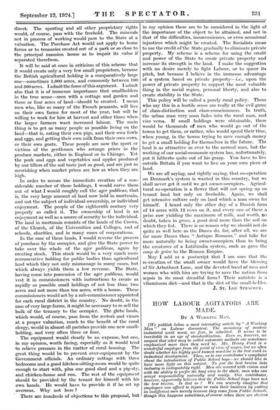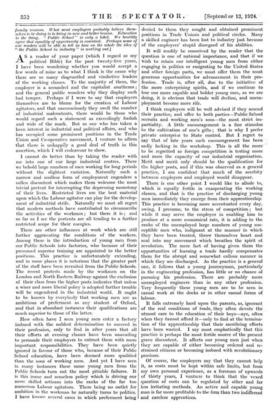. HOW LABOUR AGITATORS ARE • MADE.
BY A WORKING MAN.
-[We publish below a most interesting article by " A Working Man" on Labour discontent. The monotony of modern industrial work must, we fear, be admitted. It seems to be inevitable in an age of standardization. Even so, however, we suspect that what may be called automatic methods are sometimes emphasized more than they need be. Mr. Henry Ford is a wonderful-employer from the point of view of wages, but we often doubt whether his highly paid human machine is the last word in industrial development. Then, as to our contributor's complaint about the introduction of Public School boys—we should like to hate more light on this subject. To put the best brains into industry is indisputably right. Men arc wanted with vision and with the ability to prefer the long view to the short, men who can accept responsibility naturally and easily. Our contributor, however, apparently believes that the Public School boys have not the best -brains. Is that so-? • We can scarcely -imagine that employers can afford to injure -or ruin their business by putting in indifferent men merely because they come from Public Schools, though this happens sometimes. of course. when there are obvious
family reasons. What most employers probably believe them- selves to be doing is to bring in new and better brains. Education is the thing. " Public School" is only a label. We heartily agree that equality of opportunity is essential. Perhaps some of our readers will be able to tell us how on the whole the idea of " the Public School in industry " is working out.]
AS a reader of your paper (which I regard as my political Bible) for the past twenty-five years, I have been wondering whether you would accept a few words of mine as to what I think is the cause why there are so many disgruntled and vindictive leaders of the working classes. To the majority of them, the employer is a scoundrel and the capitalist anathema ; and the general public wonders why they display such bad temper. Perhaps if I were to say that employers themselves are to blame for the creation of Labour agitators, and that unconsciously they swell the number of industrial malcontents, there would be those who would regard such a statement as exceedingly foolish and wide of the mark. But as one who has taken a keen interest in industrial and political affairs, and who has occupied some prominent positions in the Trade Union and Co-operative movement, I venture to affirm that there is unhappily a good deal of truth in this assertion, which I will endeavour to show.
I cannot do better than by taking the reader with me into one of our large industrial centres. There we behold large numbers of men working for long periods without the slightest variation. Naturally such a narrow and soulless form of employment engenders a sullen discontent which makes them welcome the most trivial pretext for interrupting the depressing monotony of their lives. Restricted lives are the best material upon which the Labour agitator can play for the develop- ment of industrial strife. Naturally we must all regret that modern methods have contributed to circumscribe the activities of the workmen ; but there it is ; and so far as I see the portents are all tending to a further restricted scope for their energies.
There are other influences at work which are still further aggravating the conditions of the workers. Among these is the introduction of young men from our Public Schools into factories, who because of their presumed superior training are appointed to the better positions. This practice is unfortunately extending, and in some places it is notorious that the greater part of the staff have been recruited from the Public Schools. The recent protests made by the workmen on the London and North Eastern Railway against the exclusion of their class from the higher posts indicates that unless a wiser and more liberal policy is adopted further trouble will be engendered in the industrial world. It ought to be known by everybody that working men are as ambitious of preferment as any student of Oxford, and that in abundant instances their qualifications are much superior to those of the latter.
How often have I seen young men enter a factory imbued with the noblest determination to succeed in their profession, only to find in after years that all their efforts at evening classes have been unavailing to persuade their employers to entrust them with more important responsibilities. They have been quietly ignored in favour of those who, because of their Public School education, have been deemed more qualified than the sons of working men. And yet I have seen in many instances these same young men from the Public Schools turn out the most pitiable failures. It is this inane and senseless policy which is driving our more skilled artisans into the ranks of the far too numerous Labour agitators. There being no outlet for ambition in the workman he naturally turns to politics. I have known several cases in which preferment being denied to them they sought and obtained prominent positions in Trade Unions and political circles. Many a skilled engineer has been lost to industry just because of the employers' stupid disregard of his abilities.
It will readily be conceived by the reader that the question is one of national importance, and that if we wish to retain our intelligent young men from either engaging in politics or- emigrating to the United States and other foreign parts, we must offer them the most generous opportunities for advancement in their pro- fession. Trade is, after all, due to the initiative of the more enterprising spirits, and if we continue to lose our more capable and bolder young men, as we are doing, it is obvious that trade will decline, and unem- ployment become more rife.
I think employers will be well advised if they amend their practice, and offer to both parties—Public School recruits and working men's sons—the most strict im- partiality. A little encouragement is a fine stimulus to the cultivation of one's gifts ; that is why I prefer private enterprise to State control. But I regret to say that of late years such encouragement has been sadly lacking in the workshop. This is all the more' to be regretted as foreign competition is testing more and more the capacity of our industrial organization. Merit and merit only should be the qualification for the higher posts, and if this was observed as a general practice, I am confident that much of the acerbity between employers and employed would disappear.
There is one other point I would like to allude to, which is equally fertile in exasperating the working classes, and that is the practice of discharging young men immediately they emerge from their apprenticeship. This practice is becoming more accentuated every day, owing, I presume, to the stress of competition ; but while it may serve the employer in enabling him to produce at a more economical rate, it is adding to the ranks of the unemployed large numbers of young sus- ceptible men who, indignant at the manner in which they have been treated, throw themselves heart and soul into any movement which breathes the spirit of revolution. The mere fact of having given them the opportunities of learning a trade hardly compensates them for the abrupt and somewhat callous manner in which they are discharged. As the practice is a general one, it follows that a young journeyman, particularly in the engineering profession, has little or no chance of pursuing his profession. There are probably more unemployed engineers than in any other profession. Very frequently these young men are to be seen in casual work at the docks or in other casual forms of labour.
It falls extremely hard upon the parents, as, ignorant of the real conditions of trade, they often devote thb utmost care to the education of their boys—aye, often when they Cannot afford it—only to find at the termina- tion of the apprenticeship that their sacrificing efforts have been wasted. I say most emphatically that this practice is perhaps the most fertile source of the present grave discontent. It affects our young men just when they are capable of either becoming ordered and re- strained citizens or becoming imbued with revolutionary passions.
Of course, the employers say that they cannot help it, as costs must be kept within safe limits, but from my own personal experience, as a foreman of upwards of thirty years, I venture to think that the vexed question of costs can be regulated by other and far less irritating methods. An active and capable young man is far more profitable to the firm than two indifferent and careless apprentices.



































 Previous page
Previous page